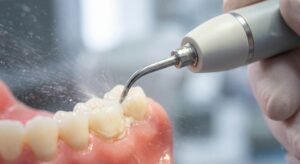Has it happened to you that you walk into the pharmacy, see a thousand mouthwash options, and don’t know which one to choose? It’s normal. We use these products every day, but we don’t always understand what they do or which one suits us best. In this article, I’ll explain clearly and simply the different types of mouthwashes and rinses that exist, what they’re for, and how they can help you take care of your mouth. Alejandra Morafrom AM Dental Studioshares her experience and some practical tips so you can make the most of your oral hygiene routine.
What is a mouthwash or rinse?
First, let’s clear this up: “mouthwash” and “oral rinse” are the same thing. They are liquids you use to rinse your mouth and complement brushing and flossing. Their purpose is to reach areas your toothbrush can’t cover as well, like between teeth or under the gums, eliminating bacteria, refreshing breath, and in some cases, helping with specific issues like cavities or gingivitis.
But be careful—not all mouthwashes are the same. There are different types depending on what you need. Below, I’ll break them down one by one.
Types of mouthwash and rinses
1. Antiseptic mouthwashes
These are the “heroes” against bacteria. They’re designed to kill germs and prevent infections, making them perfect if you have inflamed gums (gingivitis) or have just gone through a dental procedure, like an extraction. They usually contain ingredients like chlorhexidine, which is highly effective in reducing plaque.
- When to use them: If your gums are red, inflamed, or bleed when brushing, or after dental treatment.
- Benefits: Reduce inflammation, prevent infections, and help with bad breath caused by bacteria.
Dr. Alejandra Mora shares: at AM Dental StudioI’ve seen how these rinses can make a difference. Once, a patient with mild gingivitis used an antiseptic mouthwash for 10 days and came back happy because the pain had subsided by the second day. But beware: they’re strong and shouldn’t be used for long without supervision.”
Responsible use of mouthwash: risks of overuse and what actually works (1-min video) 👉
Mouthwashes do not replace brushing or flossing; they’re a complement in selected cases. As the ADA guidelines state, they can help some people, but they’re not necessary for everyone.
In recent years, studies have encouraged caution with the daily and prolonged use of alcohol-based mouthwashes. A recent trial with Listerine Cool Mint found measurable changes in the oropharyngeal microbiome after 3 months of use, with an increase in opportunistic bacteria (e.g., Fusobacterium nucleatum and Streptococcus anginosus). This does not prove that mouthwash “causes cancer,” but it suggests avoiding chronic use without indication and preferring alcohol-free formulations whenever possible.
Regarding oral cancer: the scientific evidence is mixed. Some reviews find no sufficient proof that alcohol-based mouthwashes “cause cancer,” while others observe an association when used multiple times a day (≥2–3) and in the presence of other factors such as smoking and alcohol consumption. That’s why frequency, product type, and your habits matter.
With chlorhexidine (CHX), the rule is clear: use it for specific indications and limited time. Prolonged use can stain teeth and prosthetics and alter taste.
2. Fluoride mouthwashes
These contain fluoride, a mineral that strengthens tooth enamel and prevents cavities. They’re ideal if you have a history of cavities or want to maximize protection.
- When to use them: If you’ve had cavities, wear braces, or want to prevent tooth sensitivity.
- Benefits: Strengthen enamel, prevent cavities, and reduce sensitivity.
Dr. Alejandra’s tip: “If you already use fluoride toothpaste, this rinse is a great bonus. At the clinic, I often recommend it to patients with braces, since they tend to have a higher risk of cavities.”
3. Cosmetic mouthwashes
These are the classics that promise instant fresh breath. They don’t cure problems but leave your mouth feeling clean and fresh.
- When to use them: Before a date or if you need to freshen your breath quickly.
- Benefits: Instant freshness and a clean mouth feeling.
Dr. Alejandra’s opinion: “They’re perfect in a pinch, but if bad breath is constant, they won’t fix it. Better stop by AM Dental Studio so we can check the root cause.”
4. Natural or alcohol-free mouthwashes
Made with ingredients like essential oils or herbs, these rinses avoid alcohol to be gentler. They’re ideal if you have dry mouth or prefer something less harsh.
- When to use them: For daily use without irritation, or if you have braces and want more comfort.
- Benefits: Less irritation and a gentler option for your mouth.
Dr. Alejandra’s note: “Some patients with braces tell me these rinses are their favorite because they don’t sting—something crucial when your mouth is already sensitive.”
How to choose the right mouthwash?

It all depends on what you need. Here’s a quick guide:
- Inflamed gums: Use an antiseptic (no more than two weeks without consulting).
- Prevent cavities: Go for one with fluoride.
- Occasional bad breath: Cosmetic rinses are your quick solution.
- Gentle daily use: Choose natural or alcohol-free ones.
Recommendation from Dr. Alejandra: “Not everyone needs mouthwash daily. If you brush well and floss, you may not need it. But if there’s a specific problem, like inflammation, it’s a great ally. At AM Dental Studiowe help you choose the right one in a personalized consultation.”
👍 How to use mouthwash correctly?
It’s easy, but these tricks will help you get the most out of it:
- Amount: Follow the package instructions (usually 10–20 ml).
- Time: Rinse for 30–60 seconds, reaching every corner.
- Don’t use water afterward: Let the ingredients work.
- Don’t swallow it: Safe in small amounts, but not meant to drink.
Warning: Chlorhexidine rinses are not for long-term use without supervision, as they can affect your mouth’s balance.
Do you really need mouthwash?
Dr. Alejandra Mora explains: “At AM Dental StudioI see that many believe mouthwash is essential, but it isn’t always. If your hygiene is good, you may not need it. However, in cases like gingivitis or after surgery, an antiseptic rinse can be key to controlling inflammation and preventing complications.”
Other tools, like oral irrigators, clean well between teeth, but don’t replace the medicinal effect of a prescribed rinse. In short: use it if you need it, but don’t worry if your mouth is healthy.
Conclusion: choose well and smile better
Mouthwashes and rinses are excellent allies for your oral health, as long as you choose them according to your needs. Whether it’s to fight bacteria, prevent cavities, or freshen your breath, there’s a perfect one for you. If you’re unsure which to use, at AM Dental Studio we’re ready to help. Book an appointment with Dr. Alejandra Mora and our team for personalized advice.
Ready to give your smile a boost? Start today and enjoy a healthier mouth!





